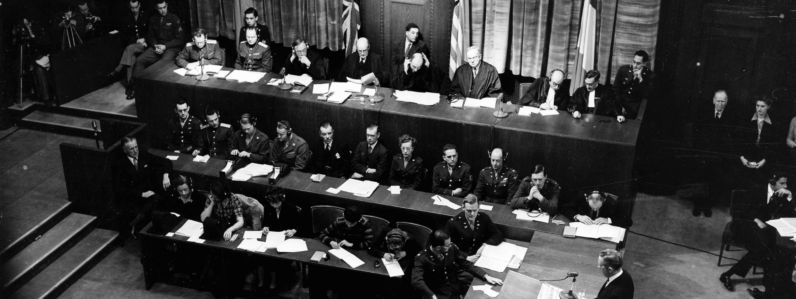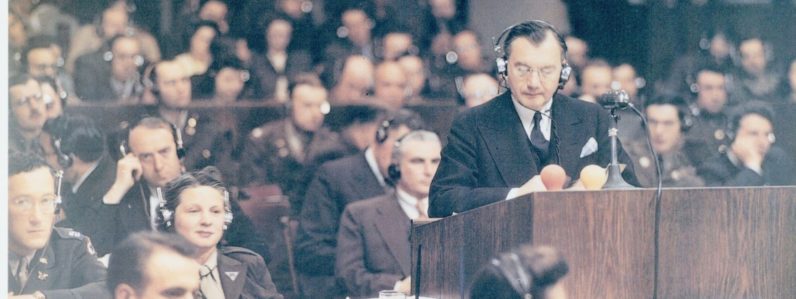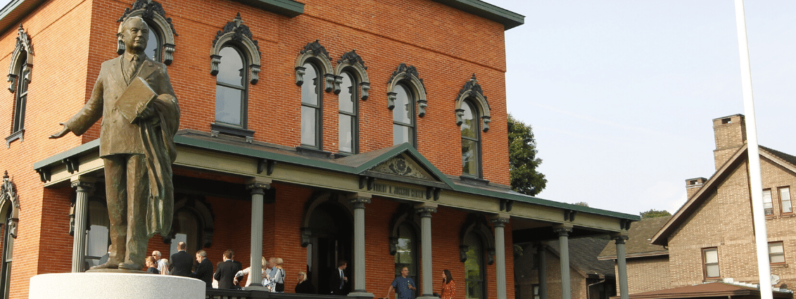SOCIAL JUSTICE UNDER OUR CONSTITUTION
ADDRESS
PREPARED BY ROBERT H. JACKSON
SOLICITOR GENERAL OF THE UNITED STATES
FOR DELIVERY AT
NATIONAL CONFERENCE OF CATHOLIC CHARITIES
JOHN MARSHALL HOTEL
RICHMOND, VA
8:00 PM
OCTOBER 11, 1938
Humility best becomes a New Dealer in the presence of this group which knows Catholic social teaching. In most companies we may claim some leadership; here, in truth, we can claim only to have followed - and at a considerable distance behind - in trying to correct social evils which have long ago roused the anxiety of great leaders of the Church.
It is perhaps natural that a priesthood loyal to the tradition of helping the poor, and so living very close to the struggles, disappointments, and sufferings of men, should have seen the dangerous social trends of our time. But it also takes courage to denounce social injustice, for such statements are never welcomed by the rich and the powerful. Liberal thought in America is deeply in debt to the insight and courage of Catholic churchmen. But we are depressed that it takes so long to translate faith into works; that the conception of the common good takes so long in getting itself accepted in the political forum and in the market place. But there is comfort in the assurance that if attainment of social justice is not yet complete, it has at last been seriously undertaken.
Liberal political thinking in America has been profoundly influenced by the Bishops' Program of Social Reconstruction, issued by four Bishops of the church, including Cardinal Hayes, shortly after the close of the World War. Too modestly disclaiming that it was a "comprehensive scheme of reconstruction", it sought to serve as "an imperative call to action" for "reforms that seem to be desirable and also obtainable within a reasonable time". But the leaders of public life chosen at that time were bent on restoring "normalcy". They had no ear for advice or reform. What suffering might have been spared to men, had the voice of the Bishops been heeded by those who cam to power in 1920, instead of having to wait for the disaster-born administration of 1933.
I can in no better way lead up to my subject of "Social Justice Under our Constitution” than to set forth the concept of social justice found in the Bishops' program of Social Reconstruction which pretty accurately outlines the social objectives of the political liberals of today.
As a philosophical foundation, it accepts the present industrial system of private ownership of capital as desirable and as destined to last for a long time in its main outlines. This, of course, rules out of consideration communism, socialism or fascism.
"Nevertheless," say the Bishops, "the present system stands in grievous need of considerable modifications and improvement. Its main defects are three: Enormous inefficiency and waste in the production and distribution of commodities; insufficient incomes for the great majority of wage earners, and unnecessarily large incomes for a small minority of privileged capitalists."
This is the essence of the liberal position today. And only those call it communistic who are simply unable to distinguish between communism and the moderate reforms which tend to defeat and forestall communism.
The entire Social Security program of this administration - and more - was foreshadowed by the Bishops' declaration for a "comprehensive provision for insurance against illness, invalidity, unemployment, and old age. So far as possible the insurance fund should be raised by a levy on industry." This administration now has accomplished a part of this, inadequately perhaps, and we have the constitutionality of unemployment compensation and old ago benefits now upheld, with implications equal to sustaining this whole plan of social insurance.
The Bishops' program to improve the condition of labor included the long time objective that workers should not remain more wage earners, but must become owners, at least in part, of the instruments of production. It recognized that the attainment of these ends would be slow.
But the more immediate program included support for a high wage level, both as a measure of morality and as an economic measure to sustain a high purchasing power. It advocated the legal minimum wage, labor's right to share in management, and championed "the right of labor to organize and to deal with employers through representatives" and said, "It is to be hoped that this right will never again be called in question by any considerable number of employers". We have found this hope a little over-optimistic. But we now have the Wagner Labor Relations Act, and it has been hold to be constitutional, and the Wage and Hours Law has been enacted.
The Bishops characterized child labor as a “reproach to our country”, advocated its abolition, pointed to the Supreme Court decision holding unconstitutional the law that prohibited child labor made goods from moving in interstate commerce, and pointed to the effort to tax child labor out of existence. They evidently did not anticipate the further constitutional difficulties which arose when the Supreme Court declared the tax also unconstitutional. Now, after a lapse of twenty years, as part of the Wage and Hour Bill, we have new child labor prohibitions and will try once again to get approval of the Supreme Court to abolish this "reproach to our country".
The Bishops also foresaw the need for land settlement colonies, a United States Employment Service, housing projects, and a system of both public and private vocational training.
The Bishops held wealth to a high degree of social responsibility. They advocated “heavy taxation of incomes, excess profits and inheritances" to relieve the poor of injurious tax burdens, and so "the small class of specially privileged capitalists will be compelled to return a part of their unearned gains to society." They demanded "prevention of monopolistic control of commodities, adequate government regulation of such public service monopolies as will remain under private operation", restriction of private enterprise to a fair return on investment, and declared that "human beings cannot be trusted with the immense opportunities for oppression and extortion that go with the possession of monopoly power."
These words were in line with Catholic social teaching as set forth in the memorable Encyclical of Pope Pius XI who noted the growing concentration of wealth and economic power and said that
" ...not alone is wealth accumulated, but immense power and despotic economic domination is concentrated in the hands of a few, and that those few are frequently not the owners, but only the trustees and directors of invested funds, who administer them at their good pleasure.” "This power becomes particularly irresistible when exercised by those who, because they hold and control money, are able also to govern credit and determine its allotment, for that reason, supplying so to speak, the life-blood to the entire economic body, and grasping, as it were, in their hands the very soul of production, so that no one dare breathe against their will."
These words of righteous indignation are the spirit and essence of the President's monopoly message which initiated new efforts to curb the evils of concentration of wealth and monopolistic practices. The Securities and Exchange Act, the Public Utility Holding Company Act, and many other measures of this administration stem from the same philosophy.
The Bishops' Program concludes: "The employer has a right to get a reasonable living out of his business, but he has no right to interest on his investment until his employees have obtained at least living wages."
This seems in keeping with the earlier statement that: "The industry in which a man is employed should provide him with all that is necessary to moot all the needs of his entire life."
That we have not yet found a way to apply that morally and economically unanswerable proposition is apparent. A year ago the most widely publicized laying off of men was done by a corporation which made net profits of $238,705,000 in 1936 and $196,701,000 in 1937, and at the end of 1937 had undistributed corporate surplus of over $395,000,000. Society paid the industry these profits. The craftsmen engaged in production are essential parts of that industry and had helped create the profit and the surplus. But all the profits and the surplus collected by the industry from the rest of society did not stop that industry from throwing its labor supply back on to the rest of society to be kept while it could not add further to its profits by using them.
The position of those industrialists who refuse all consideration of annual wages, who deny that the worker has any right in his job which they are bound to respect, seems to be this - that they are at liberty to dislocate labor markets and assemble vast numbers of men dependent upon them for work to sustain life. They will use this laboring population while it can be used at a profit. The Government must keep it for them when it cannot be used at a profit.
American political liberalism, like the Bishops' Program, is characterized by its emphasis upon social effects. It regards the social and cultural structure as of more fundamental consequence than our business structure, or even our Constitution. Our social system, consisting of homes, schools, churches, and cultural institutions, is a very ancient system. With some modification it served agricultural civilization, nomadic civilization, feudal times, and now serves our industrial civilization. But our economic system, with its corporation and factory, would, in its main outline, be something less than two centuries old, and in any proper view of either collective or individual life, our economic life should serve, and not master, our social life.
It is the clear constitutional responsibility of a liberal government to protect our social system with all the resources of the nation, just as it would provide for the common defense. This is not mere sentimentalism. An intelligent conservative philosophy, if the conservatives had one, would make the first object of conservatism the conservation of the family, which alone will save the race. Steady work and adequate income must be assured if our young people under modern industrial conditions dare to marry and establish homes and beget children and keep up our normal way of life.
The future majorities who will have to defend democracy are being cradled now. The 1960 crop of first voters is being born in this year. And, if the people of great property were far-sighted, they would be making very sure that those future majorities are not roared in the destitution which fills the heart with bitterness. And when we learn that the least fortunate third of our population, consisting of some thirteen million families and single individuals, must subsist on an average annual income of $471, we may judge the kind of family life that is being fostered among them.
Those people can only increase their incomes as they have steady access to the machinery of production, through employment. It is notorious that these productive assets are largely owned by corporations. In fact, about two hundred such corporations told over a half of all the assets owned by non-financial corporations in the country. About one-third of the industrial wage-earning population is employed by one-fifth of one percent of the country's employers, based on the old-age benefit tax returns.
Thus we see a terrific centering of the responsibility for the employer’s labor policy. When we consider the interlocking financial relationships of corporations and the industries dominated by leading units, it is apparent that the policies of industry are made by few men. They are at the wheel, and the rest of the world is in the back seat. The way they take the curves and red lights scare me.
I have been at pains to state to you the philosophy of the liberals in government so largely in the terms of your own Bishops’ Program for Social Reconstruction, because I frankly want you to see that the New Deal, judged by the studios of progressive churchmen, is neither novel nor radical. As the Bishops have well said, “Its practical applications are of course subject to discussion”, and it is here that we fall into many differences of opinion in detail.
I would be lacking either in frankness or in judgment if I were to claim that this administration’s efforts to meet the more pressing phases of this readjustment are fully adequate, or complete, or without flaw or blunder. We may more reasonably question its adequacy than its moderation. We cannot deny that it has held at bay in this country any forces that sought to turn the resentments of the depression to support either communism or fascism.
Why then should it have taken so much time to make these beginnings on a program, the need of which was proclaimed by the Bishops nearly 20 years ago. The answer is to be found in the impossibility of getting prompt action from the many States and the constitutional limitation upon the Federal Government.
The Federal Government has relatively little direct power of regulation. Its chief regulatory power is the power to regulate commerce among the several states and with foreign nations. This power, if exercised to its fullest extent, would leave large areas of our economic life untouched. The Securities and Exchange Law, the Wagner Labor Relations Act, and the Public Utility Holding Company Act have survived constitutional challenges, but each of them leaves vast numbers of transactions beyond its scope.
Is there, then, no Federal constitutional power that reaches to the heart of our economic and social life and that can be used to properly balance social welfare and private property rights?
Our forefathers gave the answer to this question in no uncertain terms. In the very first article of the Constitution, after constituting a national legislature, the very first power granted to it was: "To lay and collect taxes, duties, imposts and excises to pay the debts, provide for the common defense and general welfare of the United States." Our forefathers thus linked the general welfare of our people with the common defense of our country as one of the first objects of government, and it laid upon property and upon the economic system the obligation to support that common defense and that general welfare. "General welfare" in our constitutional language is the equivalent of the "common good" so often referred to in the Encyclicals and in Catholic social teaching.
But the general welfare clause had been so little exerted that in 1936, in the Agricultural Adjustment Act case, the Supreme Court could accurately say of the long doubt over its judicial interpretation that: "This Court has noticed the question, but has never found it necessary to decide which is the true construction."
It is one of the most surprising facts of our constitutional history that in almost one hundred fifty years before the administration of President Roosevelt no efforts had been made to use the general welfare power sufficient to call upon the Supreme Court to study its true significance. In exerting many of the other powers of the Government, prior administrations had crowded the limits of Federal power to the point where they were challenged. But prior administrations had never pressed the general welfare clause. They had, with few exceptions been committed to the "trickle theory" of prosperity, which was, in brief, that if the Government would so adjust tariffs, tax laws, and other economic legislation as to make the rich rich enough, they would allow some of the prosperity to trickle through to the workman.
This philosophy, with its 11 little black satchels, took the train out of Washington on the night of March 3, 1933. A “revolution” some jittery people called it. But it consisted of nothing more than a return to the philosophy of a government in the democratic tradition of human rights above property rights. And the Supreme Court began to have to study the great general welfare clause of the Constitution which definitely puts property rights at the service of human rights in this country.
Probably the most significant general welfare measure of this administration was the Social Security Act, in which the taxing power of the Federal Government was exerted to support a system of contributory old ago benefits and to encourage the setting up by the status of a contributory system of unemployment compensation. There were other provisions to protect the individual against the cruelties of circumstance. Those measures were far from perfect, and far from adequate. But they were sufficient exertions of the general welfare power to draw the attacks of the property-minded people who frantically sought to have them hold unconstitutional, and they were accommodated promptly by the lower courts. It is not too much to say that the kind of life we would lead in America hung in the balance as those cases awaited decision by the Supreme Court. And the Supreme Court of the United States caught something of the warmth and depth of the concept that a democracy must serve the dignity of man when Jr. Justice Cardozo, and the justices for whom he spoke, held that the general welfare clause of the Constitution warranted the drafting of the property resources of the country to deal with the plague of unemployment and of dependent old ago.
The narrow scope of the constitutional power has tended to keep Federal legislation away from simple and direct regulation. It is more frequently taking the form of regulation by the use of the taxing power and accomplishment of social ends by spending. And it has therefore been largely under the power to tax and spend for the general welfare that this administration has tackled the problem of giving its people a decent opportunity to develop their human personalities and to attain a self-respecting position in a commonwealth of free men.
More than 1,200,000 homeowners were aided to stop foreclosures. A series of farm relief acts extended drought loans, aided tenant farmers, extended credit to stop dispossessions, and a program was put into effect to resettle destitute farm families whose pitiable efforts to cultivate sub-marginal lands were turned to success on better soil.
More than 1,750,000 young men have received educational and practical work training in five years in the Civilian Conservation Corps. More than 65,000 illiterates were taught to read and write, and more than 400,000 boys left camps to accept private jobs prior to completing their terms of enrollment.
The National Youth Administration, established by the President under the W.P.A., whose great director you are to honor tomorrow night, has aided youth, in and out of school, at the rate of 400,000 to 500,000 per year. Its dramatic story of developing drifting youth into responsible citizens is told with gripping interest by the Lindleys in "A New Deal for Youth", which I commend to your study.
Slum clearance and modern low cost housing projects have been advanced.
A wage and hour bill to end sweating and underpayment of fathers and mothers was passed over bitter opposition. The Social Security Act is a reality. The National Labor Relations Act is gradually forcing an acceptance of real collective bargaining by labor.
Public works projects and work relief have been pursued to accomplish the ends of relief without sacrifice of self-respect.
Always the power of government has been exerted to give to the uncounted folks an opportunity to keep their personal integrity and dignity and self-respect.
If the struggle of the future is to be fought out within the framework of our Constitution, I do not doubt that the division between our liberal and our conservative parties will be largely over the use to be made of the power to appropriate money for the general welfare. No power is so instinctively resisted by the property-minded as the power to tax and spend. Fundamentally, many of those reject the democratic concept of a democracy based on regard for the dignity of man, and seek a government based on security for property.
But history will record of the administration of Franklin D. Roosevelt that he restored the American Government to its constitutional function of promoting the general welfare, and that he restored the vitality to the American concept of a democracy that protects the dignity, the self-respect, the personality and individuality of a man- just because he is a man.






